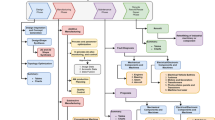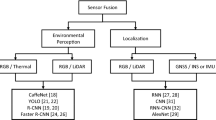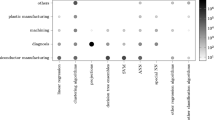Abstract
Inspired by the manufacturing costs proportion of part feeding in automotive mixed-model assembly lines (MMALs) being up to 20–35%, this paper takes the dynamic scheduling of part feeding for automotive MMALs as a crucial and complex problem. Therefore, a dynamic scheduling mechanism basing on the knowledge base (KB) and fruit fly optimization algorithm (FOA) with variable step sizes and logistic chaos (VSCFOA)-enhanced general regression neural network (VSCFOA-GRNN) is proposed to tackle the real-time part feeding scheduling problem of tow trains under the dynamic manufacturing system. A mathematical model is developed to illustrate the problem, where the throughput of the assembly line and the material delivery distance are determined as components of the objective function. Subsequently, samples of the MMAL are generated by the plant simulation software and used to train the VSCFOA-GRNN model off-line. Afterward, the trained model and KB are adopted in the real-time scheduling process to determine the optimal scheduling rule combination. Finally, the effectiveness, feasibility and accuracy of the novel scheduling mechanism are validated by computational results, especially in dynamic scheduling processes. It can cope well with changes in the dynamic environment, thus effectively realizing the higher productivity of assembly lines and better system performance.
















Similar content being viewed by others
References
Anand SV, Selvakumari RS (2019) Noninvasive method of epileptic detection using DWT and generalized regression neural network. Soft Comput 23(8):2645–2653
Asef-Vaziri A, Laporte G (2005) Loop based facility planning and material handling. Eur J Oper Res 164(1):1–11
Bacot JB, Dshalalow JH (2001) A bulk input queueing system with batch gated service and multiple vacation policy. Math Comput Model 34(7–8):873–886
Boysen N, Emde S, Hoeck M, Kauderer M (2015) Part logistics in the automotive industry: decision problems, literature review and research agenda. Eur J Oper Res 242(1):107–120
Caumond A, Lacomme P, Moukrim A, Tchernev N (2009) An MILP for scheduling problems in an FMS with one vehicle. Eur J Oper Res 199(3):706–722
Chen C, Xi BF, Zhou BH, Zhou SS (2011) A multiple-criteria real-time scheduling approach for multiple-load carriers subject to LIFO loading constraints. Int J Prod Res 49(16):4787–4806
Chen C, Xia BX, Zhou BH, Xi BF (2015) A reinforcement learning based approach for a multiple-load carrier scheduling problem. J Intell Manuf 26(6):1233–1245
Egbelu PJ, Tanchoco JMA (1984) Characterization of automatic guided vehicle dispatching rules. Int J Prod Res 22(3):359–374
Emde S, Boysen N (2010) Optimally routing and scheduling tow trains for JIT-supply of mixed-model assembly lines. Eur J Oper Res 217(2):287–299
Emde S, Gendreau M (2017) Scheduling in-house transport vehicles to feed parts to automotive assembly lines. Eur J Oper Res 260(1):255–267
Emde S, Abedinnia H, Glock CH (2018) Scheduling electric vehicles making milk-runs for just-in-time delivery. IISE Trans Oper Eng Anal 50(11):1013–1025
Fagan D, Fenton M, Lynch D, Kucera S, Claussen H, O’Neill M (2017) Deep learning through evolution: a hybrid approach to scheduling in a dynamic environment. Int Jt Conf Neural Netw 2017:775–782
Fathi M, Alvareza MJ, Rodríguezb V, Mehrabanc FH (2014a) A multiobjective optimization algorithm to solve the part feeding problem in mixed-model assembly lines. Math Probl Eng 11(1):809–812
Fathi M, Rodríguez V, Alvarez MJ (2014b) A novel memetic ant colony optimization-based heuristic algorithm for solving the assembly line part feeding problem. Int J Adv Manuf Technol 75(1):629–643
Fathi M, Rodríguez V, Fontes DBMM, Alvarez MJ (2015) A modified particle swarm optimisation algorithm to solve the part feeding problem at assembly lines. Int J Prod Res 54(3):878–893
Gupta JND, Majumder A, Laha D (2019) Flowshop scheduling with artificial neural networks. J Oper Res Soc. https://doi.org/10.1080/01605682.2019.1621220
Ho YC, Liu HC (2009) The performance of load-selection rules and pickup-dispatching rules for multiple-load AGVs. J Manuf Syst 28(1):1–10
Huang CJ, Chang KH, Lin JT (2012) Optimal vehicle allocation for an automated materials handling system using simulation optimization. Int J Prod Res 50(20):5734–5746
Jang J, Suh J, Ferreira PM (2001) An AGV routing policy reflecting the current and future state of semiconductor and LCD production lines. Int J Prod Res 39(17):3901–3921
Jeong BH, Randhawa SU (2001) A multi-attribute dispatching rule for automated guided vehicle systems. Int J Prod Res 39(13):2817–2832
Ji XP, Cao XB, Du WB, Tang K (2017) An evolutionary approach for dynamic single-runway arrival sequencing and scheduling problem. Soft Comput 21(23):7021–7037
Jiang JH, Wu D, Chen YJ et al (2019) Fast artificial bee colony algorithm with complex network and naive bayes classifier for supply chain network management. Soft Comput 23:1–17
Koo PH, Jang J, Suh J (2005) Vehicle dispatching for highly loaded semiconductor production considering bottleneck machines first. Int J Flex Manuf Syst 17(1):23–38
Kuo CH, Wang CH, Huang KW (2003) Behavior modeling and control of 300 mm fab intrabays using distributed agent oriented Petri net. IEEE Trans Syst Man Cybern Part A (Syst & Hum) 33(5):641–648
Liao DY, Wang CN (2006) Differentiated preemptive dispatching for automatic materials handling services in 300 mm semiconductor foundry. Int J Adv Manuf Technol 29(9–10):890–896
Lin JT, Wang FK, Yen PY (2010) Simulation analysis of dispatching rules for an automated interbay material handling system in wafer fab. Int J Prod Res 39(6):1221–1238
Megow N, Uetz M, Vredeveld T (2006) Models and algorithms for stochastic online scheduling. Math Oper Res 31(3):513–525
Mitić M, Vuković N, Petrović M, Miljković Z (2015) Chaotic fruit fly optimization algorithm. Knowl Based Syst 89:446–458
Oh IS, Lee JS, Moon BR (2004) Hybrid genetic algorithms for feature selection. IEEE Trans Pattern Anal Mach Intell 26(11):1424–1437
Priore P, Pino R, Parreño J, Lozano J, Monterrey M (2013) Real-time scheduling of flexible manufacturing systems using support vector machines and neural networks. Proc Int Conf Artif Intell 2:651–656
Rahimi-Vahed AR, Mirghorbani SM, Rabbani M (2007) A new particle swarm algorithm for a multi-objective mixed-model assembly line sequencing problem. Soft Comput 11(10):997–1012
Sabuncuoglu I (1998) A study of scheduling rules of flexible manufacturing systems: a simulation approach. Int J Prod Res 36(2):527–546
Seker A, Erol S, Botsali R (2013) A neuro-fuzzy model for a new hybrid integrated process planning and scheduling system. Expert Syst Appl 40(13):5341–5345
Shahrabi J, Adibi MA, Mahootchi M (2017) A reinforcement learning approach to parameter estimation in dynamic job shop scheduling. Comput Ind Eng 110:75–82
Shen XN, Han Y, Fu JZ (2017) Robustness measures and robust scheduling for multi-objective stochastic flexible job shop scheduling problems. Soft Comput 21(21):6531–6554
Shiue YR, Guh RS, Tseng TY (2009) GA-based learning bias selection mechanism for real-time scheduling systems. Expert Syst Appl 36(9):11451–11460
Shiue YR, Lee KC, Su CT (2018) Real-time scheduling for a smart factory using a reinforcement learning approach. Comput Ind Eng 125:604–614
Specht DF (1991) A general regression neural network. IEEE Trans Neural Netw 2(6):568–576
Sule DR (2011) Manufacturing facilities: location, planning, and design. CRC Press, Boca Raton
Tambouratzis T, Pazsit I (2010) A general regression artificial neural network for two-phase flow regime identification. Ann Nucl Energy 37(5):672–680
Tsai CJ, Huang HP (2007) A real-time scheduling and rescheduling system based on RFID for semiconductor foundry fabs. J Chin Inst Ind Eng 24(6):437–444
Vasant P, Barsoum NN (2006) Fuzzy optimization of units products in mix-product selection problem using fuzzy linear programming approach. Soft Comput 10(2):144–151
Waschneck B, Reichstaller A, Belzner L, Altenmuller T, Bauernhansl T, Knapp A, Kyek A (2018) Deep reinforcement learning for semiconductor production scheduling. In: 29th Annual SEMI advanced semiconductor manufacturing conference, pp 301–306
Wu LH, Mok PY, Zhang J (2011) An adaptive multi-parameter based dispatching strategy for single-loop interbay material handling systems. Comput Ind 62(2):175–186
Yang B, Lin C, Ren CL (2018) Internationalization strategy, social responsibility pressure and enterprise value. Soft Comput 24:1–8
Zain AM, Haron H, Sharif S (2011) Estimation of the minimum machining performance in the abrasive waterjet machining using integrated ANN-SA. Expert Syst Appl 38(7):8316–8326
Zang ZL, Wang WL, Song YH, Lu LY, Li WK, Wang YL, Zhao YW (2019) Hybrid deep neural network scheduler for job-shop problem based on convolution two-dimensional transformation. Comput Intel Neurosc. https://doi.org/10.1155/2019/7172842
Zhang ZC, Zheng L, Li N, Wang WP, Zhong SY, Hu KS (2013) Minimizing mean weighted tardiness in unrelated parallel machine scheduling with reinforcement learning. Comput Oper Res 39(7):1315–1324
Zheng XL, Wang L, Wang SY (2014) A novel fruit fly optimization algorithm for the semiconductor final testing scheduling problem. Knowl Based Syst 57:95–103
Zhou BH, Peng T (2019) Scheduling just-in-time part replenishment of the automobile assembly line with unrelated parallel machines. J Mech Eng Sci 233(14):5113–5130
Zhou BH, Shen CY (2018) Multi-objective optimization of material delivery for mixed model assembly lines with energy consideration. J Clean Prod 192:293–305
Zhou BH, Xu JH (2017) An adaptive SVM-based real-time scheduling mechanism and simulation for multiple-load carriers in automotive assembly lines. Int J Model Simul Sci Comput 8(4):1750048
Zhou BH, Liao XM, Wang K (2020) Kalman filter and multi-stage learning-based hybrid differential evolution algorithm with particle swarm for a two-stage flow shops scheduling problem. Soft Comput 23(24):13067–13083
Acknowledgement
This study was funded by the National Natural Science Foundation of China (Grant Number 71471135).
Author information
Authors and Affiliations
Corresponding author
Ethics declarations
Conflict of interest
Binghai Zhou declares that he has no conflict of interest. Zhexin Zhu declares that she has no conflict of interest.
Ethical approval
This article does not contain any studies with human participants or animals performed by any of the authors.
Additional information
Communicated by V. Loia.
Publisher's Note
Springer Nature remains neutral with regard to jurisdictional claims in published maps and institutional affiliations.
Rights and permissions
About this article
Cite this article
Zhou, B., Zhu, Z. A dynamic scheduling mechanism of part feeding for mixed-model assembly lines based on the modified neural network and knowledge base. Soft Comput 25, 291–319 (2021). https://doi.org/10.1007/s00500-020-05141-x
Published:
Issue Date:
DOI: https://doi.org/10.1007/s00500-020-05141-x




